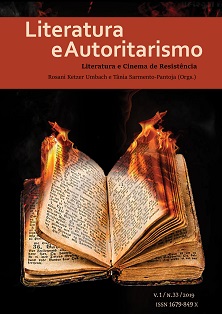Tirania na Argentina:uma análise exemplar da representação da violência em Garaje Olimpo
DOI:
https://doi.org/10.5902/1679849X35155Palavras-chave:
representação da violência, ditadura militar, não-exposição, Argentina, terrorismo de EstadoResumo
Seguindo as aspirações de se criar uma política de memória, Marco Bechis tematiza em seu filme Garaje Olimpo práticas de tortura e sequestro durante a ditadura militar argentina. Garaje Olimpo tem por protagonista María Fabiani, uma jovem que reside junto com sua mãe em uma casa na cidade de Buenos Aires. Maria é conduzida por seu inquilino, um policial militar, à prisão secreta Garaje Olimpo, onde a jovem é torturada e, por fim, assassinada. A presente análise se baseia em um conceito amplo de violência, que, entre outros, abrange a noção de repressão e visa à destruição. A análise revela no plano narrativo, estético e musical as diferentes representações de violência física, psíquica e indireta. No plano narrativo, Bechis trabalha com elementos de antecipação, com oposições de luz e escuridão, e com distância e proximidade em cenas de violência física. O resultado obtido no plano narrativo, que tende à não-exposição da violência, faz de Garaje Olimpo um filme da inquietação.Downloads
Referências
ABREGO, V. A. Erinnerung und Intersektionalität: Frauen als Opfer der argentinischen Staatsrepression (1975-1983): transcript Verlag, 2016.
AGUILAR, G. New Argentine film. New concepts in Latino American cultures. New York, NY [u.a.]: Palgrave Macmillan, 2011.
AMAR SÁNCHEZ, A. M.; AVILÉS, L. F. Prólog/Presentación. In A. M. Amar Sánchez; L. F. Avilés (Eds.). Nexos y diferencias: Vol. 44. Representaciones de la violencia en América Latina. Genealogías culturales formas literarias y dinámicas del presente Madrid: Iberoamericana, 2015, S. 9-21.
BEE, J. Folter und die Grenzen des Humanen. Zu einigen aktuellen und historischen Konfigurationen von Folter und Film. In K. Altenhain, R. Gorling, & J. Kruse (Eds.), Die Wiederkehr dr Folter? Interdisziplinare Studien Uber Eine Extreme Form Der Gewalt, Ihre Mediale Darstellung Und Ihre Achtung. V&R unipress, 2012, S. 165-226.
BENJAMIN, W. Zur Kritik der Gewalt. In W. Benjamin & H. Marcuse (Eds.), Zur Kritik der Gewalt und andere Aufsätze. 13th ed., Frankfurt am Main: Suhrkamp, 2015, S. 29-65.
BLOCH, N. Legitimierte Gewalt: Zum Verhältnis von Sprache und Gewalt in Theatertexten von Elfriede Jelinek und Neil LaBute: transcript Verlag, 2014.
DUBOIS, P. Torture and Truth (Routledge Revivals): Taylor & Francis, 2016.
FLYNN, M.; SALEK, F. F. Screening Torture: An Introduction. In M. Flynn; F. F. Salek (Eds.). Screening torture. Media representations of state terror and political domination. New York: Columbia University Press, 2012, S. 1-18.
GÖRLING, R. Szenen der Gewalt: Folter und Film von Rossellini bis Bigelow. Medien - Kultur - Analyse: Vol. 7. Bielefeld: Transcript, 2014.
HICKETHIER, K. Film- und Fernsehanalyse. 4., aktualisierte und erw. Aufl.. Stuttgart [u.a.]: Metzler, 2007.
JELIN, E. The Past in the Present: Memories of State Violence in Contemporary Latin America. In: A. Assmann (Ed.). Palgrave Macmillan memory studies. Memory in a global age. Discourses practices and trajectories. Basingstoke [u.a.]: Palgrave Macmillan, 2010, S. 61-78.
KAMINSKY, A. Marco Bechis' Garage Olimpo: Cinema of witness. Jump Cut: A Review of Contemporary Media, winter (48), 2006. Retrieved from https://www.ejumpcut.org/archive/jc48.2006/GarageOlimpo/text.html
KEPPLER, A. Mediale Gegenwart: Eine Theorie des Fernsehens am Beispiel der Darstellung von Gewalt. Suhrkamp-Taschenbuch Wissenschaft: Vol. 1790. Frankfurt am Main: Suhrkamp, 2006.
KING, J. Magical Reels: A History of Cinema in Latin America: Verso. In: Mikos, L. Film- und Fernsehanalyse. UTB: 2415: Medien- und Kommunikationswissenschaft, Literaturwissenschaft. Konstanz: UVK-Verl.-Ges, 2000.
MIKOS, Lothar. Ästhetik der Gewaltdarstellung in Film und Fernsehen : Genrespezifik und Faszination für Zuschauer. TV-Diskurs : Verantwortung in Audiovisuellen Medien, 2001, 16. Ministerio de Educación de la Nación. Canción a la Bandera: (De la Ópera Aurora). Retrieved from http://www2.me.gov.ar/efeme/20dejunio/cancancion.html 29
NATTER, A. Die filmische Darstellung der argentinischen Diktatur (Diplomarbeit). Universität Wien, Wien, 2010. Retrieved from http://othes.univie.ac.at/11408/1/2010-09- 16_0347099.pdf
PAGANI, A. (Producer). & Bechis, M. (Director). Junta. Garage Olimpo: Garaje Olimpo, 1999.
ROBBEN, A. Vom Schmutzigen Krieg zum Völkermord: Argentiniens wechelvolle Erinnerung an eine gewalttätige Vergangenheit. In E. Halbmayer & S. Karl (Eds.), Global Studies. Die erinnerte Gewalt. Postkonfliktdynamiken in Lateinamerika. Bielefeld: Transcript, 2012, S. 31-56.
SCARRY, E. The Body in Pain: The Making and Unmaking of the World: Oxford University Press, 1985. Retrieved from https://books.google.de/books?id=NEaz8I0KAk4C
SHAW, D. Contemporary Latin American Cinema: Breaking into the Global Market: Rowman & Littlefield Publishers, 2007.
VIEIRA, P. Seeing Politics Otherwise: Vision in Latin American and Iberian Fiction. Toronto: University of Toronto Press, 2011.
VIEIRA, Patricia. "Torture and the Sublime. The Ethics of Physical Pain in Garaje Olimpo," Dissidences: Vol. 1: Iss. 2, Article 10, 2006. http://digitalcommons.bowdoin.edu/dissidences/vol1/iss2/10 (2017-04-12)
VILLA, P.-I. Symbolische Gewalt und ihr potenzielles Scheitern. Eine Annäherung zwischen Butler und Bourdieu. Österreichische Zeitschrift für Soziologie, 36(4), p. 51-69, 2011. https://doi.org/10.1007/s11614-011-0003-5
VRANJES, S. Gewalt in ihrer grausamsten Form: Folterdarstellung in Serien und Spielfilmen. TV Diskurs, 14(51), S. 80–83, 2010.
WALDENFELS, B.. Aporien der Gewalt. In M. Dabag & J. Altounian (Eds.), Schriftenreihe "Genozid und Gedächtnis" des Instituts für Diaspora- und Genozidforschung an der Ruhr-Universität Bochum. Gewalt. Strukturen Formen Repräsentationen. München: Fink., 2000, S. 9-24.
WULFF, H. J. Die Erzählung der Gewalt: Untersuchungen zu den Konventionen der Darstellung gewalttätiger Interaktionen, 1990. Retrieved from http://www.derwulff.de/1-3-3.
Downloads
Publicado
Como Citar
Edição
Seção
Licença
DECLARAÇÃO DE ORIGINALIDADE E EXCLUSIVIDADE E CESSÃO DE DIREITOS AUTORAIS
Declaro que o presente artigo é original e não foi submetido à publicação em qualquer outro periódico nacional ou internacional, quer seja em parte ou na íntegra. Declaro, ainda, que após publicado pela Literatura e Autoritarismo, ele jamais será submetido a outro periódico. Também tenho ciência que a submissão dos originais à Literatura e Autoritarismo implica transferência dos direitos autorais da publicação digital. A não observância desse compromisso submeterá o infrator a sanções e penas previstas na Lei de Proteção de Direitos Autorais (nº 9610, de 19/02/98).






